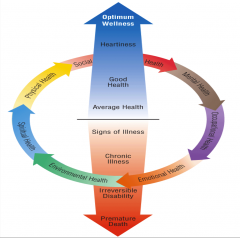![]()
![]()
![]()
Use LEFT and RIGHT arrow keys to navigate between flashcards;
Use UP and DOWN arrow keys to flip the card;
H to show hint;
A reads text to speech;
28 Cards in this Set
- Front
- Back
|
Study out of Australia suggeststhat sleeping inmight not be a good idea because it disrupts our body clocks. This disruption is enough to causea feeling of Monday morning “jetlag”
|
Sleeping in causes "Monday Blues" |
|
|
What Said: “Healthis, therefore, seen as a resource for every day life … Health is apositive concept emphasizing social and personalresources, as well as physicalcapabilities.” |
World Health organization (WHO) 1986, Ottawa charter |
|
|
Living life fully is determined by your decisions |
Wellness |
|
|
Name the 7 Dimensions of wellness |
1)Physical2)Interpersonal/Social 3)Mental/Intellectual4)Occupational 5)Emotional 6)Environmental7)Spiritual
|
|

|
The wellness continuum |
|
|
Requireshealthy eating, exercise, learning about disease, getting regular check-ups
|
1) Physical Wellness |
|
|
Involveslearning effective communication skills, developing the capacity for intimacy, and cultivating a support network
|
2) Interpersonal/Social Wellness
|
|
|
Includesan openness to new ideas, a capacity to think critically and to learn newskills
|
3) Intellectual Wellness
|
|
|
Asense of personal satisfaction derived from career/career development
|
4) Occupational Wellness
|
|
|
Includesoptimism, trust, self-esteem, self-control, an ability to share feelings
|
5) Emotional Wellness
|
|
|
Personalhealth depends on the health of the planet (e.g., violence, pollution) and protecting yourself from hazards
|
6) Environmental Wellness
|
|
|
Involvesthe capacity for love, compassion, forgiveness, joy, altruism, and fulfillment. A guilded set of beliefs
|
7) Spiritual Wellness
|
|
|
Aresource for decreased personal stress
|
7) Spiritual Wellness
|
|
|
What diseases are communicablefrom one person to another E.g. Tuberculosis/ Common Cold
|
Infectious Diseases |
|
|
What diseases developand become worse over a period of time, caused in part (and sometimes) bylifestyle factors. E.g. Cancer/ Stroke
|
Chronic Diseases |
|
|
Early-to-mid1900s:•Lifeexpectancy = 58.8 yrs(M), 60.6 yrs(F)
What was the main cause of death? |
Infectious Diseases |
|
|
Term for Illness or disease
|
Morbidity
|
|
|
In modern Canada:Lifeexpectancy (2007-2009):M = 78.8 yearsF = 83.3 years
What is the Main cause of death? |
Chronic Diseases |
|
|
Do people have control over forming chronic diseases? |
Yes, Lifestyle habits have a great impact |
|
|
Individuals must do these 5 things in order to believe they can change their bad habits |
1) Know that a behaviour is associated with (or causes) a health problem
2) Believeand accept the behavioural costs 3)Recognize risk-reductionstrategies 4) Believe the benefits of stopping 5) Believe significant others want to help them |
|
|
Name a few ways one can alter their bad behaviours/ habits
|
1) Evaluate pros vs. Cons 2) Boost self-efficacy 3) Identify and learn how to overcomebarriers to change |
|
|
Developed by Prochaska and DiClemente
A Study involving individuals problem behaviour such as alcohol abuse. |
Transtheoretical Model for BehaviourChange
|
|
|
Name 6 stages of the Transtheoretical Model |
Stage 1: Precontemplation
Stage2: Contemplation Stage 3: Preparation Stage 4: Action Stage 5: Maintenance Stage 6: Termination |
|
|
Q: Spiritual health is best describedas having: a) a strong support network of family/ friends b) meaning and purpose in one’slife
c) the ability to express oneself creatively d) the ability to share one’sfeelings |
Answer: B |
|
|
2)The best course of action for behaviour- related diseases is:
a) chemical treatment b) surgical treatment c) prevention d) rehabilitation |
Answer: C |
|
|
True of False? Having an external locus of control is associated with motivation and commitment to change behaviour |
Answer: False |
|
|
True or False? Individualsin the contemplation stage of change have no intention ofchanging their behaviour |
Answer: False |
|
|
Which Stage in the Transtheoretical Model requires the most amount of time? a) Stage 1: Precontemplation b) Stage 3: Preparation c) Stage 4: Action Stage d) Stage 5: Maintenance |
Answer: D Maintenance lasts from 6 months to 5 years |

